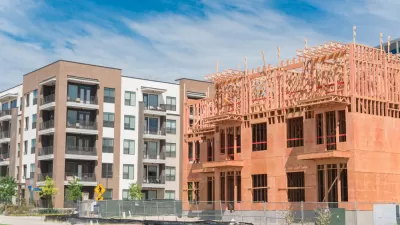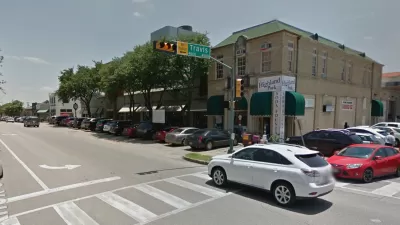Dallas has launched an effort to reform its "burdensome" parking policies, which have been left largely in the hands of local development districts.

In Dallas, a city where parking requirements have not changed in 60 years, city staffers have undertaken an effort to review and reform the city's parking regulations and overhaul its "byzantine permitting process," reports Peter Simek in D Magazine.
As cities around the country reckon with the legacy of parking requirements, planners are evaluating the effects of mandatory parking minimums—and policies that reduce them—on the urban fabric. "It is now clear that burdensome parking policies can drive up the cost of development, make it harder for new businesses to open and for developers to build affordable housing, incentivize the demolition of historic properties, and contribute to environmental dangers like the urban heat island effect." Oak Cliff City Councilman Chad West initiated the effort to reform Dallas-area parking last year, when, as chair of the Housing Committee, he "led something of a crusade to overhaul the city’s byzantine permitting process."
Andreea Urdea, a Romanian-born urban planner who trained and worked in Europe's compact, walkable cities, is leading the research arm of the project, which aims to reform Dallas's "lackadaisical approach to comprehensive planning" that has allowed zoning and land use regulations to be "continually adapted to fit the needs of every individual property owner," writes Simek. "Udrea’s job has been to research the parking rules, create local case studies that illustrate how those rules shape development, and examine ways other cities have reformed their approach to parking" in order to inform a future approach for Dallas. Udrea insists that her main task is to provide context. "Whatever approach Dallas takes to redrafting its parking regulations" she says, "will need to reflect an extensive community engagement process and be adopted by elected officials."
FULL STORY: She Came to Fix the Parking

Planetizen Federal Action Tracker
A weekly monitor of how Trump’s orders and actions are impacting planners and planning in America.

DARTSpace Platform Streamlines Dallas TOD Application Process
The Dallas transit agency hopes a shorter permitting timeline will boost transit-oriented development around rail stations.

Congressman Proposes Bill to Rename DC Metro “Trump Train”
The Make Autorail Great Again Act would withhold federal funding to the system until the Washington Metropolitan Area Transit Authority (WMATA), rebrands as the Washington Metropolitan Authority for Greater Access (WMAGA).

Supreme Court Ruling in Pipeline Case Guts Federal Environmental Law
The decision limits the scope of a federal law that mandates extensive environmental impact reviews of energy, infrastructure, and transportation projects.

Texas State Bills to Defund Dallas Transit Die
DART would have seen a 30% service cut, $230M annual losses had the bills survived.

Bikeshare for the Win: Team Pedals to London Cricket Match, Beats Rivals Stuck in Traffic
While their opponents sat in gridlock, England's national cricket team hopped Lime bikes, riding to a 3-0 victory.
Urban Design for Planners 1: Software Tools
This six-course series explores essential urban design concepts using open source software and equips planners with the tools they need to participate fully in the urban design process.
Planning for Universal Design
Learn the tools for implementing Universal Design in planning regulations.
Roanoke Valley-Alleghany Regional Commission
City of Mt Shasta
City of Camden Redevelopment Agency
City of Astoria
Transportation Research & Education Center (TREC) at Portland State University
US High Speed Rail Association
City of Camden Redevelopment Agency
Municipality of Princeton (NJ)





























